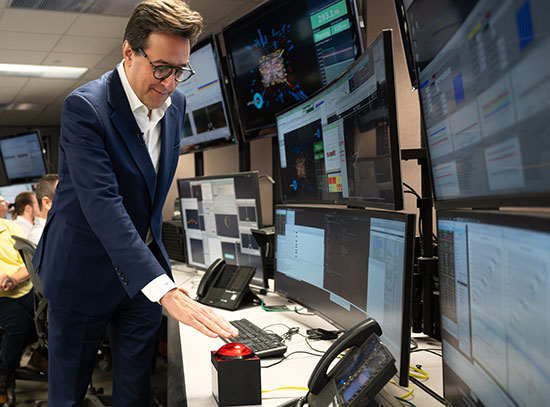Brookhaven Lab's Joanna Fowler to be Inducted into the Long Island Technology Hall of Fame
February 24, 2009
UPTON, NY — Joanna Fowler, Director of Radiotracer Chemistry, Instrumentation and Biological Imaging Program at the U.S. Department of Energy’s Brookhaven National Laboratory, will be inducted into the Long Island Technology Hall of Fame at a ceremony and reception to be held at the Garden City Hotel on March 4. One of four 2009 inductees, Fowler will be recognized for major contributions to brain research and the study of diseases such as addiction using a medical imaging technique called positron emission tomography (PET).
The Long Island Technology Hall of Fame recognizes, honors and preserves the contributions, accomplishments, and dedication of historical figures or current leaders in science or technology who have an impact on society. The organization raises funds for scholarships, outreach, and research initiatives that will ensure Long Island’s economic and intellectual leadership.
“I am delighted to receive this honor,” Fowler said. “I’m gratified that my research has led to a better understanding of the mechanisms of addiction and other diseases and has also aided in the diagnosis of disease.”
Fowler’s current research centers on using PET to study the brain circuits that are disrupted in drug addiction. Some of her early studies include imaging the uptake and movement of cocaine in the human brain, which shed light on why the drug is so powerfully addictive. She is also involved in PET studies to understand the action of therapeutic drugs and facilitate the introduction of new drugs into the practice of medicine.
Fowler’s recent work is centered on variations in MAO genes and how they affect personality and vulnerability to psychiatric disorders. In earlier research, she discovered that cigarette smokers have reduced levels of monoamine oxidase (MAO), an enzyme that breaks down dopamine, the neurotransmitter that mediates reward, motivation and movement. This finding may account for a high rate of smoking in individuals who are depressed or addicted to drugs.
In 1976, Fowler and her colleagues synthesized 18F-flouorodeoxyglucose (FDG), a radiotracer used in PET. Today, FDG is widely used in hospitals and research centers throughout the world for studying the brain and diagnosing cancer.
After earning a B.A. in chemistry at the University of South Florida in 1964 and a Ph.D. in chemistry at the University of Colorado in 1967, Fowler carried out postdoctoral research at the University of East Anglia, in Norwich, England and at Brookhaven Lab. Joining the Laboratory in 1969, she spent her entire career at Brookhaven.
Fowler’s honors include the Society of Nuclear Medicine’s Paul Aebersold Award and the Department of Energy’s E.O. Lawrence Award, both received in 1997; the American Chemical Society’s Francis P. Garvin-John M. Olin Medal in 1998, and the Glen T. Seaborg Award in 2002. She was elected to the National Academy of Sciences in 2004 and she has been selected to receive the National Academy of Sciences’ Award in Chemical Sciences in April 2009. Fowler has published close to 350 peer-reviewed articles and holds eight patents for radiolabeling procedures.
2009-10916 | INT/EXT | Newsroom










